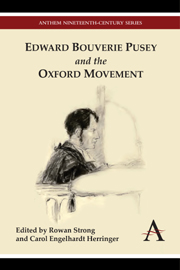Book contents
- Frontmatter
- Contents
- Acknowledgements
- Notes on Contributors
- Chapter One Introduction
- Chapter Two The History of the History of Pusey
- Chapter Three Editing Liddon: From Biography to Hagiography?
- Chapter Four From Modern-Orthodox Protestantism to Anglo-Catholicism: An Enquiry into the Probable Causes of the Revolution of Pusey's Theology
- Chapter Five Defining the Church: Pusey's Ecclesiology and its Eighteenth-Century Antecedents
- Chapter Six Pusey's Eucharistic Doctrine
- Chapter Seven Pusey, Alexander Forbes and the First Vatican Council
- Chapter Eight Pusey and the Scottish Episcopal Church: Tractarian Diversity and Divergence
- Bibliography
- Index
Chapter One - Introduction
Published online by Cambridge University Press: 05 April 2013
- Frontmatter
- Contents
- Acknowledgements
- Notes on Contributors
- Chapter One Introduction
- Chapter Two The History of the History of Pusey
- Chapter Three Editing Liddon: From Biography to Hagiography?
- Chapter Four From Modern-Orthodox Protestantism to Anglo-Catholicism: An Enquiry into the Probable Causes of the Revolution of Pusey's Theology
- Chapter Five Defining the Church: Pusey's Ecclesiology and its Eighteenth-Century Antecedents
- Chapter Six Pusey's Eucharistic Doctrine
- Chapter Seven Pusey, Alexander Forbes and the First Vatican Council
- Chapter Eight Pusey and the Scottish Episcopal Church: Tractarian Diversity and Divergence
- Bibliography
- Index
Summary
In an era noted for its outsized personalities and high achievers, Edward Bouverie Pusey was one of the most prominent and influential Victorians. Born into a minor aristocratic family and educated at Eton and Oxford, his early academic success culminated in his appointment as canon of Christ Church, Oxford, and Regius Professor of Hebrew at the University of Oxford at age 28. For the rest of his long life, from this prestigious academic position Pusey was at the forefront of public disputes over religion. As one of the co-leaders of the Oxford Movement, he was a staunch defender of the Catholic identity of the Church of England; he was also a very influential figure to the younger generation of Anglo-Catholics, including his biographer Henry Parry Liddon and Christina Rossetti.
Shortly after his death, Pusey's life and achievements were commemorated in the four-volume Life of Pusey, begun by Liddon and completed after Liddon's death by John Octavius Johnston, Robert John Wilson and William Charles Edmund Newbolt; and in Pusey House, which still houses a library, chapel, and rooms for scholars. Yet since that flurry of post-mortem recognition, Pusey has largely dropped from public memory, and from prominence among scholars of nineteenth-century British Christianity. When he is remembered, it is as a caricature. His popular image is now that of an excessively austere defender of an increasingly irrelevant and even incomprehensible way of life.
- Type
- Chapter
- Information
- Edward Bouverie Pusey and the Oxford Movement , pp. 1 - 12Publisher: Anthem PressPrint publication year: 2012

